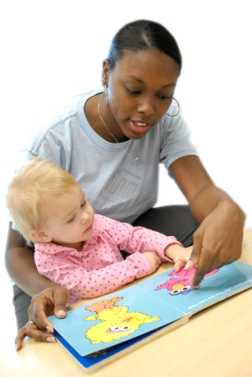Georgia SEED - How to Prepare
 Child Developmental Evaluation
Child Developmental Evaluation
An important part of the Study to Explore Early Development (SEED) is the developmental evaluation. You may bring your child to a study clinic or have SEED clinicians and nurses come to your home.
Some children will work better in a clinic setting because there usually are fewer distractions than in the home. However, if you are not able to come to the clinic, our SEED clinicians will visit your child’s home.
If you prefer the visit in your home, please prepare a private and quiet area for your child to work. This area must be free from distractions. The SEED clinician can work with you to find the best place to do the evaluation.
In either the clinic or home setting, the clinician will first introduce herself and answer any questions you might have. Then, she will play with your child to make him or her more comfortable before starting the evaluation. You also may sit with your child during the evaluation to make him or her more comfortable. During the evaluation, the clinician will ask your child some questions and engage him or her in some structured play activities. Your child will be able to take a break if needed. If your child cannot complete the evaluation, it can be continued at another time.
If you choose to visit one of our clinics, you might want to bring a favorite snack for your child in a small container.
Clinic Locations
We conduct the evaluations at GA SEED and the DeKalb Atlanta Human Services Center.
GA SEED
2250 North Druid Hills Road, Suite 100 Atlanta, Georgia 30329
Telephone Number: 404-785-9400
DeKalb Atlanta Human Services Center
30 Warren Street, SE, Atlanta, Georgia 30317
Brief Medical Examination
SEED Story Book
After the clinician completes the developmental evaluation, a trained nurse will measure your and your child’s height and head size using a tape measure, and she will weigh your child. She will ask you and your child to remove your shoes so she can obtain accurate height and weight measurements. If your child’s father is able and willing to attend the visit, she also will measure his height and head size.
After the measurements are done, she will ask that you allow her to get a sample of saliva (spit) and of blood from both you and your child. These samples will help SEED learn more about the biology of developmental problems.
You might want to talk with your child before the visit to explain the saliva collection and blood draw procedures. The picture story book is an excellent tool to review with your child before the visit.
The nurse will assist you in collecting the saliva samples using one of two ways. The first way is to collect saliva by spitting directly into a tube. The second way uses a small sponge to soak up saliva from the mouth. The nurse will give you specific instructions for the way you choose. You will need to wait at least 30 minutes after eating, drinking, or chewing gum before she can collect the saliva samples.
To help with the blood draw, you should wear a shirt with short sleeves or sleeves that you can easily pull up over your elbow. Your child should be dressed in the same way. To make the blood draw easier, please make sure you and your child have plenty of water to drink before the visit.
NOTE: Neither you nor your child has to provide a blood sample to be in the study. The decision is up to you.
If you have questions, please contact Georgia SEED via email at gaseed@cdc.gov or by telephone at 404-498-0058.
E-mail Your Friends
"Children with autism spectrum disorder are not being diagnosed as early as they could be. Learn the signs of autism and get help if you’re concerned."
Share on Facebook

“Many children with autism spectrum disorder (ASD) are not being identified as early as they could be. Early identification is the most powerful tool we have right now to make a difference in the lives of children with ASD.”
Share on Twitter
“Too many children w/ autism are not being identified as early as they could be. Earlier is better. #ActEarly”
- Page last reviewed: May 23, 2017
- Page last updated: June 27, 2017
- Content source:


 ShareCompartir
ShareCompartir